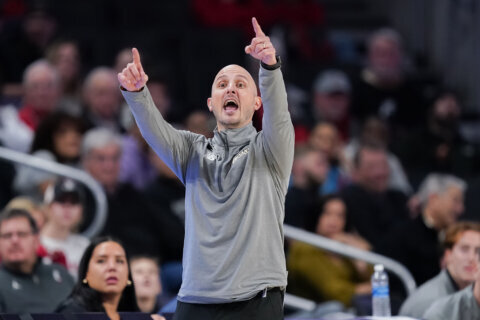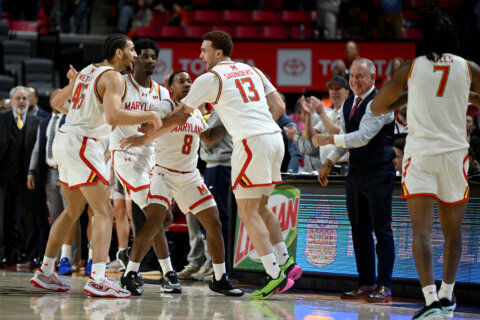WASHINGTON — Tuesday night was, by many accounts, one of the best nights in recent memory for D.C. sports. The Wizards and Capitals both won thrilling, road playoff games, while the Nats exorcised some Cardinals demons with an extra-inning, walk-off home run.
But not every fan had the chance to bask in the glory of the evening, as two of those three games were at least partially blacked out in the D.C. area.
Cox Cable subscribers in Virginia looking for the Wizards game discovered it was nowhere to be found. With the game airing nationally on NBA TV, it was blacked out locally and relegated to Comcast SportsNet. But with the Caps game taking the main spot and the cable provider contractually obligated to carry the Orioles-Blue Jays game on their overflow channel, CSN+, there simply was no room for the Wizards.
It was a rare confluence of events, one that Sports Business Journal’s John Ourand says was not only hard to see coming, but an exceedingly rare occurrence.
“You can go back and look at how often the Caps and Wizards have played a playoff game on the same day at the same time,” he says. “It hasn’t happened in a very long time, and it won’t be happening in a very long time either.”
The Caps play at the Verizon Center Thursday, then would play Game 6 Saturday and Game 7 Monday, if necessary. The Wizards play at home Friday for Game 3 and Sunday for Game 4, then not until Wednesday for a possible Game 5. There would not be another potential conflict unless both teams advanced to their respective Eastern Conference Semifinals.
It’s this fluid nature of playoff scheduling that made it so the provider likely didn’t realize the issue until it was upon them, Ourand surmises. Once the conflict became apparent, the existing contracts between the cable company and the Regional Sports Network (RSN) made it impossible to adjust on the fly.
“Asking MASN to say, ‘can you step back because more people want to see the Wizards than the Orioles?’ That’s just not going to happen,” Ourand says.
There was another, more particular local blackout in and around D.C. on Tuesday evening. Major League Baseball announced the rollout of their new Statcast system, set to revolutionize the way consumers watch the game on television. Fans were promised all sorts of new visual data as part of the presentation of the first game to be shown that way, Tuesday’s Washington Nationals-St. Louis Cardinals tilt at Nats Park on MLB Network. The official team Twitter account even promoted the technology leading into the game, retweeting this Statcast account tweet.
#Statcast equipment in place at Nationals Park. Watch the technology at work during Cards-Nats on @MLBNetwork, 7 ET. pic.twitter.com/z8P6JaChU5
— #Statcast (@statcast) April 21, 2015
But due to MLB blackout rules, the game was only seen locally on the regular MASN broadcast. The national MLB Network broadcast was blacked out in MASN’s footprint, which stretches all the way south into North Carolina. Even those with a paid MLB.TV subscription are restricted by local blackout rules.
While the mechanics are slightly different, the answer as to why this occurred is essentially the same.
“Once again, it comes down to contracts,” says Ourand. “It’s the very easy and boring answer to both of these questions.”
Local fans might wonder what good it is rolling out a new technology on television if the heavy majority of those who would actually have any interest in that particular game cannot watch it. But the foundation of the RSN system is what generates a lot of money for teams in every market. While occasionally blackout rules will be relaxed for major ESPN or FOX games, doing so for every Tuesday night, early-season game would undermine the business model.
“The RSNs are paying a ton of money for those rights,” says Ourand. “The contracts are there for a reason. They’re not going to ignore that contract just for this one game.”
Meanwhile, Nationals fans within the local television footprint still got to watch the game on the regular MASN feed. They’ll just have to wait until the next out-of-market game on MLB Network to see Statcast at work.







